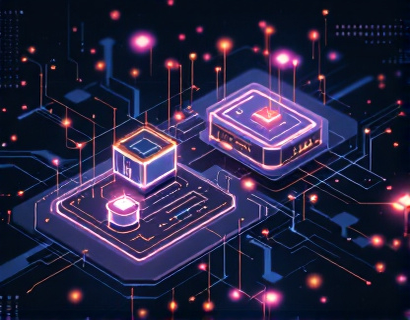AI-Powered Educational Chat Interface: Safe and Verified Access to Binary Services Knowledge for Users and Educators
In the rapidly evolving landscape of technology, artificial intelligence (AI) has emerged as a transformative force across various sectors, including education. One of the most promising applications of AI in education is the development of chat interfaces that provide users, particularly students and educators, with safe and verified access to specialized knowledge. This article explores the concept of an AI-powered educational chat interface designed to deliver accurate information about binary services and the industry, ensuring a secure and enriching experience for children and students.
Understanding Binary Services
Binary services refer to a range of services that operate on binary systems, which are foundational to computing and digital communications. These services encompass various fields, including software development, data analysis, and digital marketing. As technology continues to advance, the demand for knowledge in binary services has surged, making it essential for students and educators to access reliable information. However, navigating the complexities of this field can be challenging, especially for younger audiences.
The Role of AI in Education
Artificial intelligence has the potential to revolutionize education by providing personalized learning experiences, automating administrative tasks, and enhancing access to information. AI-powered chat interfaces serve as interactive tools that can engage students in meaningful conversations, answer their questions, and guide them through complex topics. By leveraging natural language processing (NLP) and machine learning algorithms, these chat interfaces can understand user queries and deliver relevant information in real-time.
Benefits of an AI-Powered Chat Interface for Binary Services
Implementing an AI-powered chat interface for binary services offers numerous benefits for both students and educators. Here are some key advantages:
1. Safe and Verified Information
One of the primary concerns when providing educational content to children and students is ensuring the accuracy and safety of the information. An AI chat interface can be programmed to access verified sources, filtering out unreliable or harmful content. This ensures that users receive accurate knowledge about binary services without exposure to inappropriate material.
2. User-Friendly Experience
The intuitive design of an AI chat interface makes it easy for users to interact and seek information. Students can ask questions in natural language, and the AI can respond in a conversational manner, making learning more engaging and less intimidating.
3. Personalized Learning
AI chat interfaces can adapt to individual learning styles and preferences. By analyzing user interactions, the AI can tailor responses and suggest resources that align with the user's knowledge level and interests, fostering a more personalized educational experience.
4. 24/7 Availability
Unlike traditional educational resources, an AI chat interface is available around the clock. This accessibility allows students to seek help and information whenever they need it, promoting continuous learning outside of the classroom.
5. Encouraging Curiosity and Exploration
By providing a platform for students to ask questions and explore topics related to binary services, an AI chat interface encourages curiosity and independent learning. This exploration can lead to a deeper understanding of the subject matter and inspire students to pursue further studies in technology and related fields.
How the AI Chat Interface Works
The functionality of an AI-powered chat interface is rooted in advanced technologies that enable it to understand and respond to user inquiries effectively. Here’s a breakdown of how the system operates:
1. Natural Language Processing (NLP)
NLP allows the AI to comprehend and interpret human language. When a user types a question, the AI analyzes the text to identify keywords and context, enabling it to generate relevant responses.
2. Machine Learning
Machine learning algorithms enable the AI to learn from user interactions over time. As more users engage with the chat interface, the AI becomes better at understanding common queries and providing accurate answers.
3. Content Verification
To ensure the reliability of the information provided, the AI can be programmed to access a database of verified sources. This database is regularly updated to reflect the latest developments in binary services and related fields.
4. User Feedback
Incorporating user feedback is crucial for improving the AI chat interface. Users can rate responses, and this feedback can be used to refine the AI’s understanding and enhance the quality of information delivered.
Ensuring Safety for Children and Students
When developing an AI chat interface for educational purposes, particularly for children and students, safety must be a top priority. Here are some strategies to ensure a secure environment:
1. Content Filtering
Implementing robust content filtering mechanisms can prevent inappropriate or harmful content from being accessed. The AI should be programmed to recognize and block any queries that may lead to unsafe information.
2. Age-Appropriate Responses
The AI should be capable of delivering age-appropriate responses. This involves tailoring the complexity of the information based on the user’s age and educational level, ensuring that the content is suitable for younger audiences.
3. Parental Controls
Incorporating parental controls allows guardians to monitor and manage their children’s interactions with the AI chat interface. This feature can provide peace of mind for parents while encouraging safe exploration of binary services.
4. Privacy Protection
Ensuring user privacy is essential, especially when dealing with minors. The AI chat interface should comply with data protection regulations and avoid collecting unnecessary personal information from users.
Applications in Educational Settings
The AI-powered chat interface can be integrated into various educational settings, enhancing the learning experience for students and educators alike. Here are some potential applications:
1. Classroom Support
Teachers can utilize the AI chat interface as a supplementary resource in the classroom. Students can ask questions during lessons, and the AI can provide instant answers, facilitating a more interactive learning environment.
2. Homework Assistance
Students can turn to the AI chat interface for help with homework related to binary services. The AI can guide them through problem-solving processes and provide explanations that reinforce classroom learning.
3. Research Projects
For students working on research projects, the AI chat interface can serve as a valuable tool for gathering information. It can suggest relevant resources, articles, and data, streamlining the research process.
4. Professional Development for Educators
Educators can benefit from the AI chat interface by accessing professional development resources. The AI can provide information on the latest trends in technology education, helping teachers stay informed and enhance their teaching practices.
Challenges and Considerations
While the potential of AI-powered chat interfaces in education is immense, there are challenges and considerations that must be addressed:
1. Technology Access
Not all students have equal access to technology, which can create disparities in learning opportunities. Ensuring that the AI chat interface is accessible across various devices and platforms is crucial for maximizing its reach.
2. Dependence on Technology
There is a risk that students may become overly reliant on AI for answers, potentially hindering critical thinking and problem-solving skills. Educators should encourage students to use the AI chat interface as a supplementary tool rather than a primary source of information.
3. Continuous Improvement
As technology evolves, the AI chat interface must be continuously updated and improved to remain effective. Regular assessments and updates are necessary to ensure that the AI provides accurate and relevant information.
The Future of AI in Education
The integration of AI in education is still in its early stages, but the potential for growth and innovation is significant. As AI technology advances, we can expect to see even more sophisticated chat interfaces that can provide deeper insights and more personalized learning experiences. The future may hold AI systems that can not only answer questions but also engage in meaningful discussions, fostering critical thinking and creativity among students.
Conclusion
The development of an AI-powered educational chat interface represents a significant step forward in providing safe and verified access to knowledge about binary services and the industry. By prioritizing accuracy, safety, and user-friendliness, this technology empowers students and educators to explore complex topics with confidence. As we continue to embrace the potential of AI in education, it is essential to remain mindful of the challenges and considerations that accompany this innovation. With careful implementation and ongoing improvement, AI chat interfaces can play a pivotal role in shaping the future of learning.











































